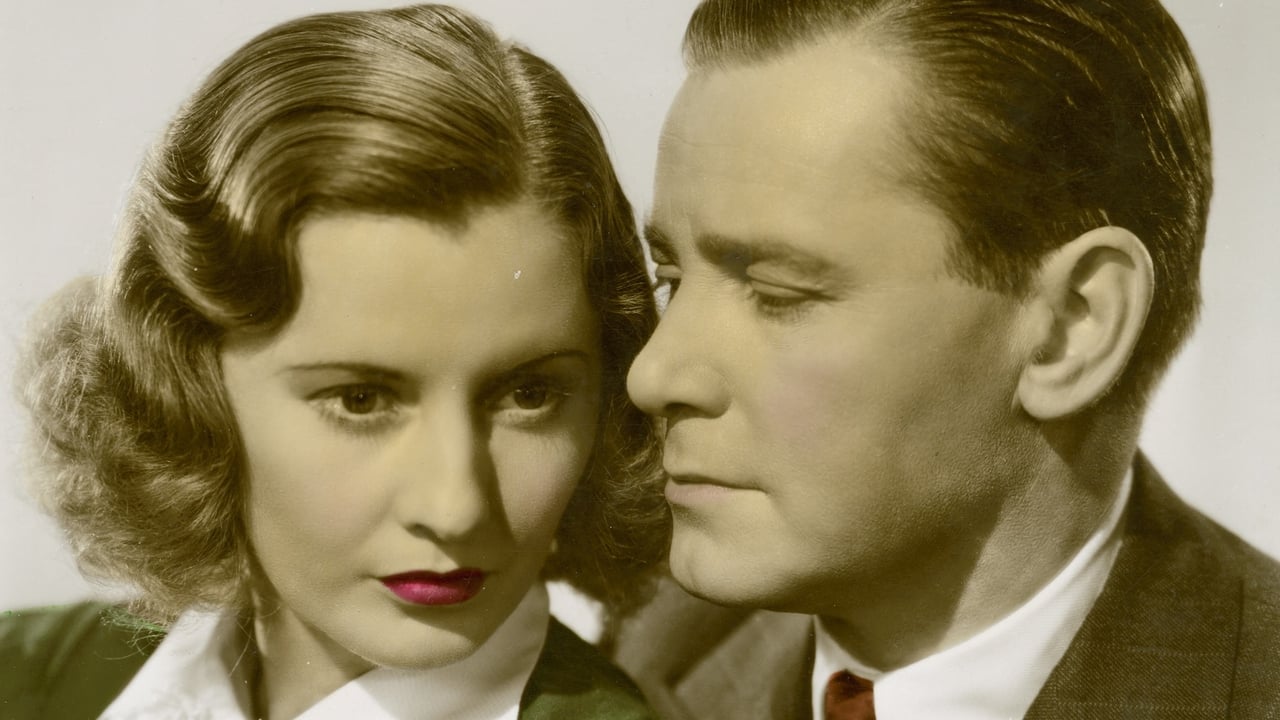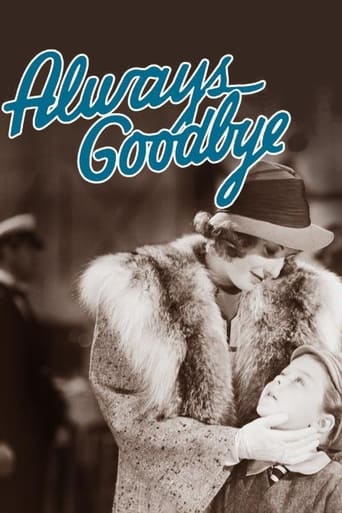

Plot so thin, it passes unnoticed.
... View Moregood back-story, and good acting
... View MoreDreadfully Boring
... View MoreThe film's masterful storytelling did its job. The message was clear. No need to overdo.
... View MoreLet me start by saying I'm a HUGE Barbara Stanwyck devotee. But the role she is given in this hapless movie is so phony that nobody could have played it successfully. The story is of course, the stuff that vintage weepies are made from. And I have nothing against weepies: as long as the characters move me, I'll happily string along, no matter how ridiculous the story.But the characters in Always Goodbye are uniformly made of paper-maché. The actors seem to know it: Ian Hunter and Herbert Marshall give mechanical performances, and Cesar Romero bounces through his role as if he's anxious to quickly get off the set.Special note: if you detest obnoxious Hollywood child actors, little Johnny Russell's performance as Stanwyck's little boy is about as excruciating as they come. Don't say I didn't warn you.
... View MoreThis movie is clearly one you must suspend all sense of disbelief in order to enjoy it. This isn't saying it's a bad film....I actually liked it. But it has a plot that certainly is far-fetched!When the film begins, Margot (Barbara Stanwyck) is waiting for her fiancé to arrive at the marriage license bureau. However, as she's waiting he's killed in a traffic accident right in front of her!!! To make things worse, she's pregnant*! So you next see her about to kill herself when she is caught by Jim (Herbert Marshall) and he takes her under his wing and gets her back on her feet. He also helps her find a nice adoptive couple when her baby arrives months later. But although Jim is marvelous, he has a real wandering spirit and is sometimes gone for years on his sea travels.In the meantime, while Jim is off on one of his voyages, Margot gets a job with a fashion studio and her life is really going well. In fact, soon a crazy Count, Gino (Caesar Romero), is chasing her and proposing marriage. He's a nice guy...just a bit full of himself. Soon after, she sees an adorable kid in a hotel and realizes this boy is her biological son she gave up years ago! So, when she learns he's going on a cruise, she arranges to go on the same ship and soon the two become inseparable. But there is a huge problem-- the boy's mother has died and the woman his father (Ian Hunter) wants to marry is just awful and cares nothing for the boy....Margot's baby! So what's she to do and who is she to marry when THREE guys all pop the question?!Thi is an enjoyable film mostly because although far-fetched, the acting is quite good and the story engaging. Well worth seeing, though it is one of Stanwyck's lesser-known films.
... View MoreReally enjoy Barbara Stanwyck and will watch any movie she's in. She can shore up even the most humdrum potboiler with her acting talent and make any picture better. Her mettle was tested in "Always Goodbye", a picture with nothing new to add to the romance genre, and she did the best she could. Alas, she was done in by a flat script and uninspired dialogue and despite an excellent support cast, featuring Herbert Marshall, Ian Hunter, Caesar Romero and Lynn Bari, among others. I'm not sure anything short of a rewrite could save this rehash of many other similarly themed pictures.This picture was shown in error at Film Forum in NYC; The 1931 film with the same name was supposed to be shown but somehow this was substituted. Right now I would rather have seen the older one. Sight unseen, I'll bet it was better than this plodding trudge through the landscape.
... View MoreBarbara Stanwyck gives an admirable charming performance as a young woman who survives a personal and emotional tragedy, and triumphs in the end. This film could have been very heavy melodrama, but the story is uplifted with some well placed comedy played exuberantly by Cesar Romero. Herbert Marshall is outstanding in his portrayal of the kind and sympathetic friend who helps Stanwyck's character to overcome and flourish. Most delightful is child actor Johnny Russell, who plays Roddy, the little boy Stanwyck had to give up at birth. The playfulness between Stanwyck and Russell is very sweet, genuine and adorable to watch. Binnie Barnes, Lynn Bari and Ian Hunter all play their roles adequately. Barbara Stanwyck is very beautiful and as always manages to shine through this routine melodrama, with its twists and turns, it is her performance which produces a most touching story. A full synopsis of this film would spoil it for the reader, and although the story may feel a little dated now, it is still a must see for all die-hard Barbara Stanwyck fans, and is also an excellent example for those who love films from the 1930s.
... View More